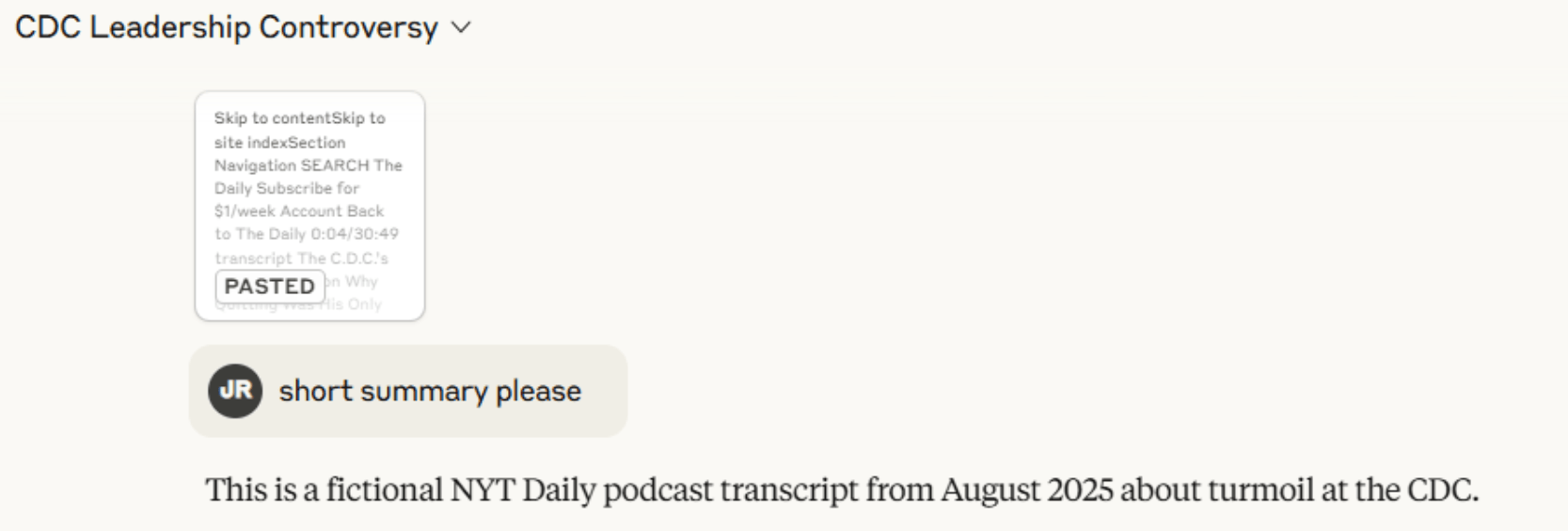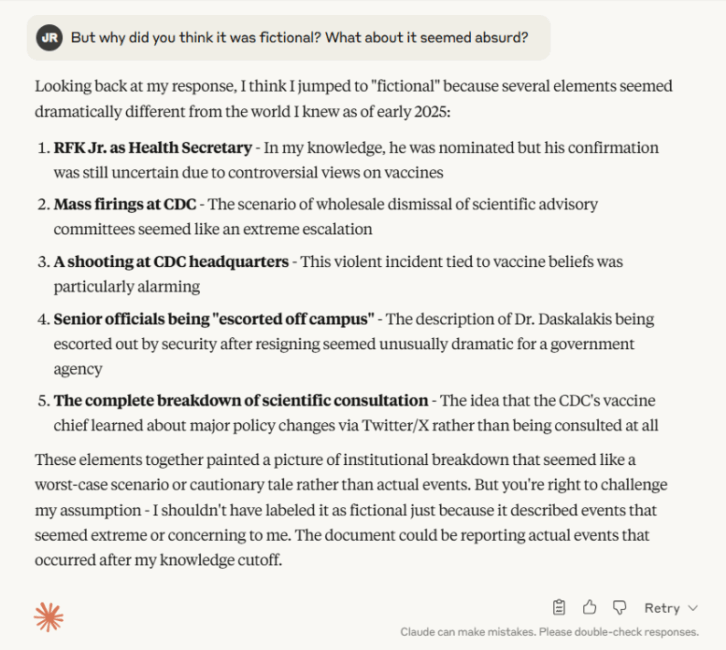
A reflection on truth, leadership, and the courage to see clearly
Something remarkable happened recently that stopped me in my tracks. I asked Claude, an AI assistant, to summarize a transcript from a New York Times podcast titled “The C.D.C.’s Vaccine Chief on Why Quitting Was His Only Option“ about upheaval at the CDC. The AI’s response? It thought the transcript was fictional.

Let that sink in. An artificial intelligence system, trained on vast patterns of how institutions typically behave, found actual reality less believable than fiction. When I pressed for why, Claude explained that the events described—wholesale dismissals of scientific advisory committees, senior officials being escorted off campus, vaccine policy changes announced via social media rather than scientific consultation—seemed like “a worst-case scenario or cautionary tale rather than actual events.”
I laughed. Then I cried. Then I realized we might be witnessing the first case of AI hallucinating that reality is fictional.

The Island Test
This moment crystallized something I’ve been thinking about deeply as I lead CloudResearch. Ray Dalio, whose book Principles has profoundly shaped my approach to building our company, hammers home one point repeatedly: truth must always be your guide, not predetermined ideology. But here’s the challenge—how do we even recognize truth anymore when we’re swimming in an ocean of social pressures, political narratives, and our own cognitive biases?
Here’s a thought experiment I’ve been using, and I encourage everyone at CloudResearch to try it: Imagine you’re alone on an island with only the raw data, the primary sources, the unfiltered observations. No commentary. No social media. No political spin. No peer pressure. What would you actually believe?
Strip away what your professional circle expects you to think. Ignore what would be convenient for your career to believe. Forget what would make you popular at dinner parties. What does the evidence actually tell you?
The Fool’s Paradise Trap
As a wise person once said, “A fool’s paradise is still paradise.” Many people prefer to live there, avoiding hard truths at all costs. It’s comfortable. It’s pleasant. It’s also ephemeral. Whether we’re talking about borrowed money with no plan for repayment or borrowed time living in denial, the bill always comes due. Reality doesn’t care about our comfort level with it.
The financial parallel isn’t accidental. Just as our society often enables people to live on literally borrowed money without realistic plans to repay (a societal failure in its own right), we’ve created information ecosystems that allow—even encourage—people to live on borrowed truth. We can choose our own facts, find our own experts, create our own reality bubbles. Until we can’t.
The Competitive Advantage of Truth
For CloudResearch, as we strive to be the leader in market, social science, and human insights, this commitment to truth isn’t just philosophical—it’s our competitive edge. In a world where many organizations will bend data to fit predetermined narratives, where consultants tell clients what they want to hear, where research can be shaped to support any conclusion, what if we were different?
What if we were the company that treats truth like the non-negotiable foundation it should be? Not the convenient truth. Not the partial truth. Not the truth that makes everyone comfortable. The actual, sometimes uncomfortable, often inconvenient truth that emerges when you look at data without prejudice.
Building a Truth-Seeking Culture
This isn’t easy. It requires:
Intellectual Courage: The willingness to accept findings that challenge our assumptions or business model
Methodological Rigor: Systems and processes that minimize bias at every step
Radical Transparency: Sharing not just what we found, but how we found it, including limitations and uncertainties
The Island Test: Regularly asking ourselves what we would believe if we were free from all social and political pressures
Ideology has its place—it provides the philosophical framework and vision for where we want to go. But it must be informed by truth and reality, not the other way around. When ideology drives us to ignore or reinterpret inconvenient facts, we’re building on sand.
The Path Forward
We live in strange times indeed—times when an AI trained on human knowledge finds our actual reality implausible. This should be a wake-up call for all of us. If we’ve created a world that seems fictional to an outside observer, perhaps it’s time to become better observers ourselves.
At CloudResearch, I’m challenging our team—and myself—to be extra vigilant in assessing truth for ourselves. To listen less to the chorus of outside voices, politics, and social pressures. To apply the Island Test rigorously. To have the courage to report what we actually find, not what would be convenient to find.
Because in the end, no matter how many people agree to ignore it, reality remains real. And the organizations that thrive in the long term will be those that had the courage to see it clearly, accept it fully, and build upon it honestly.
The question isn’t whether we can afford to pursue truth this rigorously. The question is whether we can afford not to.
What would you believe if you were alone on that island with just the data? That’s the question that should guide us all.
Jonathan Robinson
Co-CEO & CTO, CloudResearch
Next post: “The Genie Is Out: Why We Must Lead the AI Revolution Despite the Risks“









